Inquiring Readers: I welcome today Tony Grant with a guest post on Tenby, Wales, a place that in all probability Jane Austen had visited. Tony, who writes often for Vic’s Jane Austen’s World blog , as well as his own blog London Calling, and I had been cyber-discussing Jane Austen’s knowledge of the seaside – I sent him the link to the Brian Southam essay “Jane Austen Beside the Seaside” (see below) – he was immediately prompted to write more about Tenby, a place he is very familiar with because it is his wife’s birthplace. Just reading this piece and seeing Tony’s pictures makes me want to go back to Wales and continue to explore more of this incomparable coastline! … The question today however is, did Jane Austen actually visit Tenby? If she did it seems to have taken place in those no-letters gap years of 1801-04, so we cannot know for sure…. Read here what Tony has to say about it all…
*******************
TENBY
Tenby is old, very old. The ground it sits on is a high bluff promontory formed from a hard rugged limestone plateau worn and eroded at the edges creating spectacular cliffs and rock formations. Its strata upended and twisted by continental landmass shifts over 400 million years ago, and underlined by smooth yellow sands, is the result of a 700 million year process, a process that has created a very beautiful landscape that stretches all around Pembrokeshire; the bit of Wales that sticks out into the Irish Sea at the south western tip. It is this combination of geology, seascape and the rich and diverse flora and fauna that has attracted visitors and tourists over hundreds of years.
Visitors come to experience walking along sunken country lanes within the shadow of high hedgerows that are full of a multitudinous variety of wild flowers, herb robert, knapweed, chicory, yarrow, ox eye daisies, common hawkweed, hearts tongue and maiden hair spleenworts. The olfactory experiences are delicious. Above our heads kites and kestrels, guillemots and large sea going gulls wheel and slice the clean air. Visitors can stand on the cliffs looking out over the sparkling sea and catch sight of dolphins, porpoises, basking sharks, orcas and wales. They can hear and see gulls and puffins, skylarks and choughs and on the beaches visitors come across jelly fish and turtles. Atlantic grey seals use secluded coves and bays, along this coast, to give birth.
Pembrokeshire, the county within which Tenby is situated, is a jewel that has never been much affected by modern industrialisation, and scarring developments in its landscape. In the 18th,, 19th and early 20th centuries, mining for the rich anthracite which comprises one of the many geological strata’s that pervade Pembrokeshire, were mined but the mines have closed down and disappeared long ago. It is, nowadays a struggling farming region. The people of Pembrokeshire rely on tourism and many farmers are diversifying into this area, opening fun parks, country zoos and offering country pursuits such as horse riding and trekking.
Tenby is a small town that has mostly developed within its medieval town walls. The street layout and town plan is medieval. Its earliest mention is in “Etmic Dinbych, or In Praise of Tenby,” a 9th century poem that is preserved in the 14th century Book of Taliesin. It probably began as a hill fort. Norse invaders and settlers probably developed it later as a trading point. The Normans after 1066 really developed Pembrokeshire and
took charge of the area with their iron fist, building the immense fortification of Pembroke Castle and a whole string of other castles called the Landsker Line. It was after this that Tenby developed its town fortifications and the castle on castle hill. The castle in Tenby was developed by the Normans on a higher promontory overlooking the town. It was attacked by the native Welsh in 1187 and again in 1260.
The town you see today has many fine Georgian buildings and more recently, Victorian Villas and cottages. There are still some fine examples of 13th and 14th century buildings too and many of the Georgian and Victorian additions have cellar and tunnel complexes that were created in the medieval period to bring goods and provisions from the harbour .
Tenby became famous during the Georgian period as a place for the middle classes and wealthy to visit on holiday. The French Revolution (1789 -1799) followed by the Napoleonic Wars (1799-1815) curtailed, somewhat, the grand tour of Europe that many well off Georgians liked to embark upon. Travel within Britain to the beauty spots of the British Isles flourished during this period. The Lake District was a place to visit, the Highlands of Scotland, The West Country and indeed Tenby and the beautiful West Coast of Wales was also included in this desire for tourism the pursuit of health, art and literature.
I have visited Tenby and Pembrokeshire twice a year, for over thirty years. My wife comes from Tenby so we have always visited her sister and mum and dad. Our children have had the privileged opportunity to experience the beautiful countryside and the wonderful breaches. So we are in the company of Jane Austen and the Austen family.
Jane writes in a letter to Cassandra dated Wednesday 15th – Friday 17th June 1808,
“I hear a very bad account of Mrs Whitefield; a very good one of Mrs Knight, who goes to Broadstairs next month. Mrs Sharpe is going with Miss bailey to Tenby.”
That is the only mention of Tenby by Jane herself. The letters in the period before 1808, the years 1801 to 1804, when the Reverend Austen, his wife and two daughters were gallivanting around seaside resorts in the West country and South Wales are lost to us now. That draconian, terrible letter cull of her sisters letters by Cassandra after Jane’s death are the reason for this lack of correspondence that might have revealed Jane’s direct response to visiting Tenby. However, the tone of the commentary in the above letter, written by Jane, telling Cassandra about the travels of acquaintances to various holiday resorts reveal that she was well acquainted with those places herself. For instance Broadstairs is in Kent on the coast, not far from Canterbury. Of course, just south of Canterbury, a mere half a dozen miles, is situated, Godmersham Park, the principal estate of Jane’s brother, Edward Knight. She would have known Broadstairs.
Brian Southam, in an article for Persuasions, entitled, “Jane Austen Beside the Seaside: Devonshire and Wales 1801 – 1803,” provides more evidence. Brian Southam relates, “Jane’s movements during these lost years can only be deduced by hints and glimpses found in other sources.” A recollection from Anna Lefroy sent in 1862 to James Edward Austen Leigh, who gathered evidence for his memoir of Jane, states that,
“She was once, I think, at Tenby- and once they went as far north as Barmouth.”
Barmouth is much further north from Tenby and Pembrokeshire, on the coast of the Snowdonia National Park, which is in the Welsh mountains; another beautiful area to visit.
The writing of tour guides were flourishing at this time to help promote the areas of natural beauty such as Pembrokeshire and Tenby. The artist Charles Norris (1779-18580) lived in Tenby in a small terraced cottage overlooking the harbour. There is a blue plaque on the wall of his cottage that you can see as you wend your way down the steep narrow path from the high street, wedged between overhanging Tudor, stone built houses . Norris’s cottage is directly opposite the Tudor Merchants House. He produced a series of etchings of Tenby and wrote about Tenby in a guide book. The Austen’s may well have owned a copy and consulted Norris’s pictures and information about the place.
I have actually asked in the Tenby Museum, situated on Castle Hill overlooking the town, about Jane’s visit to Tenby. The people in the museum are convinced she stayed in the town but do not know which house the Austens rented. What would we give for a signed bill or contract for the rental of a house by the Austens? Maybe somewhere, in some cupboard or box, stored away in a Tenby cellar is such a document. There is every chance that the house still exists they would have stayed in. Most, if not all the properties built in the Georgian period remain, giving Tenby a genteel and somewhat sophisticated air, raising it above what was really a thriving fishing and trading port at the time. Admiral Lord Nelson visited and stayed in Tenby with Lord and Lady Hamilton. East Rock House, situated within an elegant Georgian Street has the evidence on a plaque relating to such a sojourn. “Admiral Lord Nelson stayed here, 1802.” That was round about the time the Austen’s could have been there.
Tenby was developed as a resort by Sir William Paxton. In 1802, local resident, merchant banker and politician, Sir William Paxton bought his first property in the old town. He invested heavily in the town, with the full approval of the town council. Engineer James Grier and architect Samuel Pepys Cockerell were briefed to create a “fashionable bathing establishment suitable for the highest society.” His baths came into operation in July 1806, and after acquiring the Globe Inn transformed it into “a most lofty, elegant and convenient style” to lodge the more elegant visitors to his baths. Cottages were erected adjoining the baths, and livery stables with an adjoining coach house. In 1814 a road built on arches overlooking the harbour was built at Paxton’s expense. He later got passed a Bill in Parliament to enable fresh water to be piped through the town. However the theatre he built in 1809 was closed in 1818 due to lack of patronage.
[Image from Pubs Galore]
The house he had built for himself in the main square in Tenby is now Paxton’s Hotel and Bar. It is a very popular place in the summer months. The sea water baths, built on the edge of the cliff overlooking the harbour in one direction and the sea in the other, constructed for the purpose of promoting health and for bathing and drinking are still there, although converted into a house. The Ancient Greek legend is still prominently picked out in stone above its entrance.
Tenby has had many famous people visitors to it and some have lived there for a while. Henry Tudor who was born in Pembroke Castle, escaped from Tenby through the tunnels under the town when being pursued by Richard III’s agents. It was from Wales, with a predominantly Welsh army he marched into England and secured his kingship at Bosworth Field, defeating Richard III in 1485.The Tudor dynasty grew out of Wales and came to dominate Europe and begin the British Empire.
George Eliot lived in a house in Tenby for a while. Robert Record (1512-1558), the inventor of the equals sign lived here. Augustus John and his sister Gwen John, the early twentieth century artists lived here for a while. Rather obtusely, Bill Clinton visited in the 1990’s. I am not sure what that tells you about the allure of Tenby. Beatrix Potter visited and another rather unusual visitor was, Haillie Selassie, during his exile in Britain between 1936 and 1941. Towards the end of the 18th century John Paul Jones, who has been infamously saddled with beginning the American Navy, was the most notorious pirate in these waters. One of his officers, nicknamed ‘Leekie’ Porridge, came from Tenby. John Paul Jones’s crew used to land on Caldey Island, the monastic island off shore from Tenby, to obtain provisions.
The Coach and Horses, a lovely pub and restaurant in Tenby has a claim to literary fame. In 1953 Dylan Thomas, who was in Tenby to perform a poetry reading in the pub, had one or two to drink. When he left The Coach and Horses he left a first draft of “Under Milk Wood” that he was working on at the time on the bar stool. Dylan was living at the boathouse in Laugharne, a few miles along the coast at the time.
As I mentioned above I have been to Tenby many times. It is a wonderful place. It has major scientific importance. I have also mentioned a little about the geology of the area. Pembrokeshire provides a whole array of geological and fossil evidence. It is so rich in wildlife and wild flower diversity it is an important area for the study of plants too. Its archaeology and history is integral to the study of the British Isles as well. It is a place for the academic as well as the sunbather and also a place for Jane Austen to visit and enjoy.
Further Reading:
- Brian Southam, “Jane Austen beside the Seaside: Devonshire and Wales 1801 – 1803. http://www.jasna.org/persuasions/printed/number33/southam.pdf
- The Tenby Museum: http://www.tenbymuseum.org.uk/
- Tenby at wikipedia: http://en.wikipedia.org/wiki/Tenby
- Maps of Wales: http://www.virtualtenby.co.uk/map-of-south-wales.asp?lon=-3.808313&lat=51.656803&zoom=9
- Pembrokeshire National Park website: http://www.pembrokeshirecoast.org.uk/default.asp?PID=4


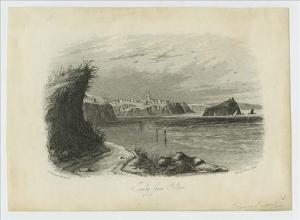
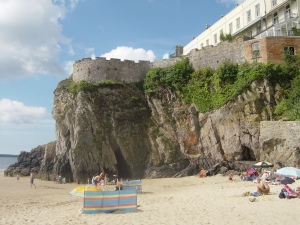
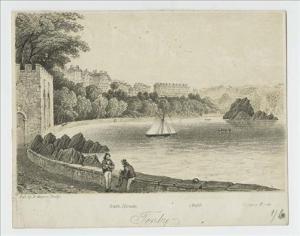
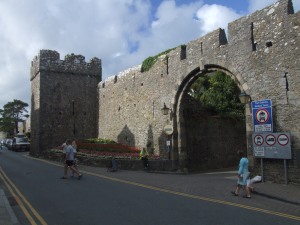

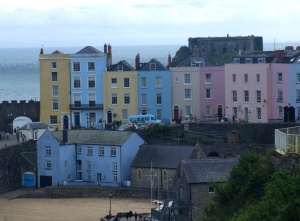

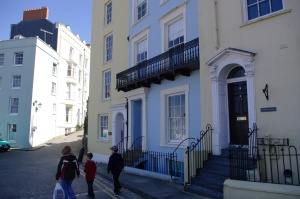
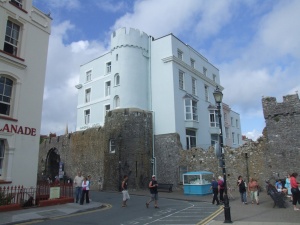

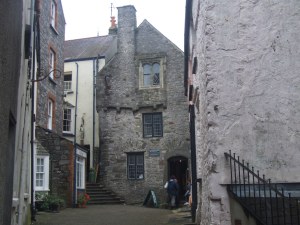

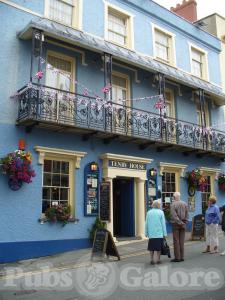


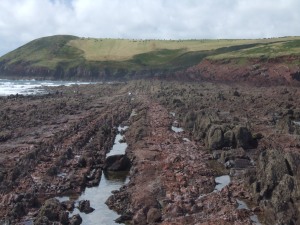

As always, Tony writes a grand post. So glad he is spreading the wealth amongst us, Deb! Love the images and the info.
LikeLike
Thanks Vic for sharing Tony with me for this Tenby post – it is great to have someone “on the ground” as they say!
Deb
LikeLike
Thank you for such a detailed and intriguing post. I couldn’t help but think of Catherine Morland at Northanger Abbey while reading, “What would we give for a signed bill or contract for the rental of a house by the Austens? Maybe somewhere, in some cupboard or box, stored away in a Tenby cellar is such a document.” Catherine was so disappointed to find bills rather than a horrific manuscript, when in this case we would love such a document!
LikeLike
Yes Lizzy, a great thought about Catherine Morland! Glad you enjoyed Tony’s post – makes one want to go to Tenby, doesn’t it?!
Deb
LikeLike
Most definitely!
LikeLike
Thanks, Deb, Vic and Lizzy. Just a little extra information for all you who enjoy a walk in the countryside. The Pembrokeshiire National park has a coastal footpath that runs for 186 miles from Poppit to Amroth
It passes 58 beaches and 14 harbours and is well worth taking time to explore.
Pembrokeshire is one of those rare, very beautiful places,that combine romantic castles, literary and artistic connections, fantastic beaches, a rich variety of wildlife and opportunities to take part in many outdoor pursuits from , sailing, surfing, diving,canoeing, climbing, swimming, walking,cross country running, golf, deep sea fishing,beach fishing,river fishing, horse riding, exploring the Preselli Hills where the bluestones used in the construction of Stonehenge came from,, archaeological sites from the iron age and historical sites and buildings from all startas of british history..
To tell you the truth, you should all a book a holiday in Pembrokrshire straightaway!!!!!!!!
LikeLike
Oh my, it sounds heavenly. You’ve convinced me, Pembrokrshire is on the list! Thanks!
LikeLike
Thanks Tony for this added push for Pembrokeshire! – I shall have to ask for a trip for Christmas – do hope Santa is listening [do you think he reads BLOGS?]
LikeLike
Very interesting. The history runs like this. Health dominated British thinking towards the end of the 18th century especially how to recover from Gout. The indulgent wealthy and their’ hangers on ‘had used Spa Towns led by the ever popular Bath and got to the vital restorative ‘waters’ by stagecoach.As the French Revolution shocked the English establishment as nothing had done since the Norman Conquest and as the American colonies had just been lost and as massive inter party fighting was going on in Parliament under a monarch influenced constitution with the first British born German Hanovarian King in power many took to the Sea to calm nerves and stay healthy.The Napolonic Wars had also added to insularity and lack of opportunity to travel with the brief exception of the Peace of Amiens when some Englishmen went over to Paris to take a quick look at the Emperor Napoleon.The peace did nor last.Nelson bombarded Boulonge adding a fourth hit to his 3 famous naval battles of The Nile,Copenhagen( the Danes had the sudacity to back the French) and finally Trafalgar.
As such Tenby ,in summer -tranquil and vegitationally prolific west Wales with its own local Pembrokeshire Gentry having set the pace to have sea side homes and emulate english fashions, was on offer by steamboat from Bristol….something new. Lady Holland went to Tenby to ‘take the sea salt waters’ being among the great social ladies of London gossip salons.1802 would have been the year Jane Austin went and she may have even gone for one overbight stay. Nelson himself went ..with Lady Hamilton his lover, and used the extensive facilities of her husband’s Tenby home as the Hamiltons had already focused on Milford Haven as a great natural estuary to train sailors in the ranker Admiral’s forte…signaling with semiphore and flags.His skills decided Trafalgar. He could turn the fleet in a click.He was technologically ahead of the enemy.A Norfolk man he once stated’ I am a Norfolk man and glory in it’ he also liked West Wales as being so remote from talkative society as he was with his lovely lady.Jane Austen and others will have know his movements.Ships were waiting to take summer visitors to Tenby from Bristol. It was near Bath.It soon got to be known in London which mattered not to Jane Austen.Trains later took over and moved thousands to Tenby.There is no airport yet so flight for tourists did not expand EU natural interest. The local government is pretty awful and the MPs from both major parties(the seats shift and both are marginals) are truely inconsequential and underwhelming of late.
Tenby is very special.It has a mini climate.It has a sheltered main North Bay and splendid beach with regency homes and another very sheltered sun hit Harbour with beach and yet another small cove beach sitting under a disused castle and a protective hill and finally a grand sweep of a beach on the South Shore sheltered in traditional geomorphorlogical protection by the Giltar Peninsular.The place is fabulous when the sun shines and mild all year if wet in the early months.
The towns proximity to other former industrial towns yet to find economic revival after the collapse of long gone industries like shipbuilding and coal leads to a group of younger tourists into late night party life affecting the town’s serenity but this is the economic order and there is noise rather than violence as say on a grander scale in Tampa Fl.The town cries out to resort to its former glory and its ageless refined former fans who returned to take vacations.In the UK and in Wales Tenby is unique.
Of course historical celebrities went there but so did many others who had lots of fun and sustainment in seeing something extremely beautiful.The sort of celebrity the town did not need was probably Neil Kinnock,the failed Labour politician from the same depressed Welsh valleys 100 miles up line from Tenby that have yet to move on and move forward.But all people who get to Tenby get refined and then reconsider what is on offer in life.
Garfield Smith. London.
Born Tenby 1950 and lived there to 1970.Returning most months.
LikeLike
Hello Mr. Smith – a delightful and thorough history! – many thanks for adding so much to Tony’s Tenby post – makes one all the more want to visit! – should we start a Tenby Fan Club?
Thank you for stopping by,
Deb
LikeLike
The town and county is so beautiful and fasinating. It has enormous geology.It has amazing mini ,climates and it has above all to me a massive complex history.It is almost in Wales but not that welsh in the south. On your excellent report you will know the artist Augustus John was actually born in Tenby at what is now the Belgrave Hotel.To this same hotel arrived my widowed grandmother Sarah MAY nee Bennett of Collumpton Devon with her child Gordon aged 5 to attend as a companion to the wife of an Army General. His husband a Mr May was a soldier.She also resided in the same residence until meeting her second husband Arthur Smith born Tenby 1876 into the Smith family who had arrived to deal in horses and carriages in 1836 living in St John’s Hill.They also ran a Fish store in Tudor Square and had stables in Creswell Street.My own father was born in Tenby 1912.He left me immense files and books and photographs of mainly his retired life but much earlier material on Tenby and lived in Harding Street…No 9 was purchased cheaply in WW2 by my mother who had a Supervisory job at FW Woolworth in the High Street while her husband served in the Navy WW2 in the MED.It was cheap as it had a sitting tenant and the lady,a widow called \Mrs Kingdom,died in 1961 as I was sitting the old 11 plus examination and so we had no longer to pay rental at 9 Park Road where I had lived since 1956.Before I lived in the appartment where I was born in LLoyds Bank House Tudor Square.Tenby has changed in many ways but never the natural beauty.The biggest proiblem in Tenby is the socialising of heavy partying and drinking groups from the formerly if not still depressed WRlsh industrial zones who are said by numerous people to disturb the peace but Tenby seemingly needs to attract anyone commercially.The type of visitors in my time living in the town camde mainly in summer and there being far moer hotels and B and B establishments 1950-71 when I lived with my parents….from 1969 away on and off in University.The council is doing some things tio mitigate the noise and abuses but it is the type of people.They have no real jobs and rarely persue interests and not a lot hads been done to reinvest in the zone between Newport and run down Swansea.My firied Lord Don Anderson former Mp for Swansea is Chairman of Labour Friends of Israel. His own town ha sthe highest percentage of state employees in any Uk cty but wages are low and jobs often supurflous.The area produced Lord Kinnock who had limited appeal to the Englsiuh and cost Labour the necessary 1992 election to try and off set the damages of Thatcherism and the reduction of industrial output.Wales will pof course lean still heavily to Labour but there is a regular 33 per cent Conservative vote in Wales and small lingering strong Liberal vote and youth dominated Welsh Nationalist element.Pemnbrokeshire itself is very marginal but both main Parties seem to prefer candidates to go to Parliament that are from outside the county.Pembroke Dock has a considerable influence on the local Labour Party but akin to the Wales depressed valleys has not changed much from a psychology of 1920s thinking..it remains a poor town. Tenby can never be poor as it attracts many people of all types to see the natural beauty.There are also many new residents in South Pembrokeshire since the 1970s and the area always held strong attraction from Midlands people as I gathered when working a short time in Birmingham in 1976-77 for ESSO UK.Now Londers are also finding it.It is a good place to retire but the old need ajacent hospitals.It is not well represented politically.Thge local MP is a Huntsman.The last one has no educational qualifications whatsoever but was close to Kinnock.The County Council is interesting but full of independents.The place is best seen as a magnificent place to breath the fresh air and partake in the stunning views and hear the sea.It remains a health resort.The whole UK is now in a certain decline as the former penal colony of Australia soars ahead and as the Us looks more to the Pacific region.The Uk desparately needs to change but it is difficult to do this is such a low profile political nation.There are just not enough jobs for the youth.
LikeLike
Thank you Gary for this informative post about Tenby – I see Tony has responded to you – perhaps you are related!? or at least have other other Tenby connections – who knew Tenby could get such a dialogue going! – so glad you stopped by,
Best,
Deb
LikeLike
Garfield, thank you so much for your very informative additions to my post about Tenby.. We must meet up in one of these days and have a beer together in the The Lifeboat or Pictons Bar perhaps.
All the best,
Tony
My wife actually comes from Redberth on the Pembroke Dock Road by the way.
LikeLike
I agree Garfield, that at the moment Britain is in decline However the whole of Europe is in decline due to the world financial crisis.Our industry is at nil growth. We are making cut backs in our spending to get the national debt down, which means less money in the system. However we are planning new great infrastructure projects for the future. We are trying to become leaner and fitter and eventually the economy will pick up.Britain will have adapted and become perhaps a different Britain in the future but we will grow again and be vibrant once more.
You are right about drunken youth marauding in Tenby at the weekends. I don’t know what it is like in the States, Deb, but town and city centres here are full of young adults at the weekend drinking, clubbing and going to music venues and,getting themselves into right states, sometimes. I wish i was there with them. ha! ha! but that is not the whole story. Not all get into paralytic drunken states. i like a drink or two myself on occasions and i am sure you do too Garfield, unless you have religious objections, and i am sure you like a creme de menthe or nice glass of Merlot or even a beer sometimes Deb?
We have a talented youth generation coming through in Britain We will have our writers, artists, musicians, scientists , architects, engineers and teachers of the future..I know, I’ve taught them. I know what is emerging out of our youth,
All the best,
Tony
LikeLike
Tenby seemed a shade rougher this lovely summer.Better to be on beaches than in the crowded town. Parking presented a severe problem. I drive in from my smaller house in Carmarthenshire 40 miles from Tenby. From my London house to west Wales it is a 3.5 h0ur drive of 200 miles and all motorway.Such high numbers of visiting tourists is unusual and primarily due to Covid 19 presenting Tenby as a far safer choice for a holiday or day- visit than places overseas or the colder English North Sea Coast. Cornwall is ever more subscribed this summer. Tenby kicked off in April with wonderful weather when rest of UK was far cooler.. such .sunshine shared with only Ireland. Summer was pleasantly acceptable but September was glorious and October held up so well. These two months of ‘indian summer’ are the very best in TENBY as I recall all my life….. 1950 to today… so far. However doing A level examinations in Tenby School in June 1968 the weather was like ‘ mediterranean’ climate stimulating my composure of history answers on medieval trade all over Europe. On the day of the World Cup Final in 1966 which England won it rained all day in Tenby and South Beach was empty much f that summer as there was a high incidence of rainfall all season.
LikeLike
Times move on. The problem for TENBY is like the problem for Wales. It is the combination of BREXIT having such a downturn effect on the UK economy( Wales voted Brexit more heavily than English rurality and small towns when main cities voted remain) an the non taxable role of the Wales Senydd..more a sad replacement for sound former local Government of County Councils. The Senydd now simply wants more Members and wants to contain and control money spending visitors by taxing vacation homes and making it more difficult to enjoy Wales by suggesting WOKE focus on how to behave. Labour support remains strong in South Wales but not in England and so more complicatons can follow but the Wales Conservative elected MPs in border constituencies( not the two Pembrokeshire MPs who were important in the removal of the clown Boris Johnson) remain of a low grade quality and do little for economic development in Wales. Meantime Labour remains a corrupted very leftist Party and its main areas remain poor bar Cardiff which handles the incoming funds now all from Westmister . EU regoinal help funds went with regretable Brexit vote. Swansea is particularly poorly administered. Look at it. Mr Sunak is trying to now reengage with EU helped by King Charles who likes Tenby. He it this clear to me in the third of my 3 meetings with him.
LikeLike